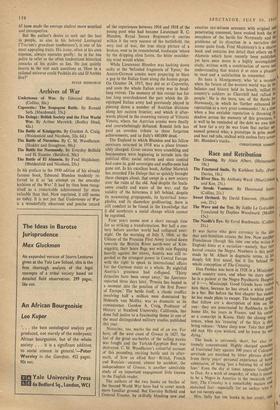Archives of War
The Battle of El Alamein. By Fred Majdalany. (Weidenfeld and Nicolson, 25s.)
IN his preface to the 1930 edition of his already famous book, Edmund Blunden modestly re- ferred to it as 'an attempt on the oracular archives of the War.' It had by then been recog- nised as a remarkable achievement far more valuable than that. Now reprinted, it still seems so today. It is not just that Undertones of War is a wonderfully observant and precise record of the experiences between 1916 and 1918 of the young poet who had become Lieutenant E. C. Blunden, Royal Sussex Regiment—it carries within it the very essence of the battlefield, the very feel of war, the true sharp picture of a broken, ever to be remembered, landscape 'where by the dripping alien farms, the bitter moulder- ing wind would whine.'
While Lieutenant Blunden was looking down sadly at the 'befouled fragments of Ypres,' the Austro-German armies were preparing to blast a gap in the Italian front along the Isonzo gorge. On October 24, 1917, they did so at Caporetto, and soon the whole Italian army was in head- long retreat. The memory of this retreat has for too long overshadowed the part which the ill- equipped Italian army had previously played in pinning down a number of Austrian divisions along her eastern frontier, and which it after- wards played in the crowning victory of Vittorio Veneto, where the Austrian armies were finally and overwhelmingly defeated. Ronald Seth has paid an overdue tribute to these forgotten achievements, and to Italy's 680,000 dead.
The England to which Blunden and his fellow survivors returned in 1918 was a place irrever- sibly changed. Great estates were crumbling and businessmen were beginning to intrude into the political elite; social reform and state control had come in, gold sovereigns and muffin-men had gone out. In his excellent book, Arthur Marwick has recorded The Deluge that so quickly brought these changes about, that swept in a new society over the ruins of the old. And despite the loath- some cruelty and waste of the war, and the validity of the bitterness it left behind, despite its nauseating propaganda, its hysterical xeno- phobia and its shameless profiteering, there is still comfort to be found in the knowledge that it did accelerate a social change which cannot be regretted.
Four years seems now a short enough time for so striking a transformation. But half a cen- tury before another world had collapsed over- night. On the morning of July 3, 1866, as the Uhlans of the Prussian First Army trotted down towards the Bistritz River north-west of Kijn- niggrittz, their lance flags wet with rain flapping heavily against the staves, Austria was still re- garded as the strongest power in Central Europe with the right to speak in international affairs for the German states as a whole. By nightfall Austria's greatness had collapsed. 'Thirty dynasties have been swept away,' the Spectator reported three days later, 'Prussia has leaped in a moment into the position of the first Power of Europe.' The battle itself, a classic conflict involving half a million men dominated by Helmuth von Moltke, was as dramatic as its consequence. Gordon A. Craig, Professor of History at Stanford University, California, has done full justice to a fascinating theme in one of the most distinguished military studies published this year.
Navarino, too, marks the end of an era. For here, off the west coast of Greece in 1827, the last of the great sea-battles of the sailing navies was fought and the Turkish-Egyptian fleet was destroyed. C. M. Woodhouse's colourful account of this pounding, exciting battle and its after- math, of how an allied fleet—British, French and Russian—secured, almost by accident, the independence of Greece, is another admirable study of an important engagement little known to the English reader.
The authors of the two books on battles of the Second World War have had to cover much more familiar ground. But Eversley Belfield and General Essame, by skilfully blending new and
emotive eye-witness accounts with original and penetrating comment, have evoked both the at' mosphere of the battle for Normandy and the problems of its direction in a narrative that seems quite fresh. Fred Majdalany's is a shorter book and contains less detail than others on DI Alamein which have recently been published, yet here once more is a highly accomplished study, written with a combination of verve and understanding that makes it at once a pleasure to read and a satisfaction to remember.
Its hero is Montgomery, who 'at a moment when the future of the western world was in the balance and history held its breath, rallied III'S country's soldiers as Churchill had rallied its people.' He is the hero, too, of the Battle fat Normandy, in which he 'further enhanced htS reputation as a very great commander.' At a dos When a less enviable reputation is throwing 1et shadow across the memory of this greatness, It is well to be reminded of the debt we owe hitnt of how far a cry he was from that earlier 110', named general who, a prototype in grim moon and best red tabs, stalked with useless fury across
Mr. Blunden's tracks.
CHRISTOPHER HIBBERf




























 Previous page
Previous page